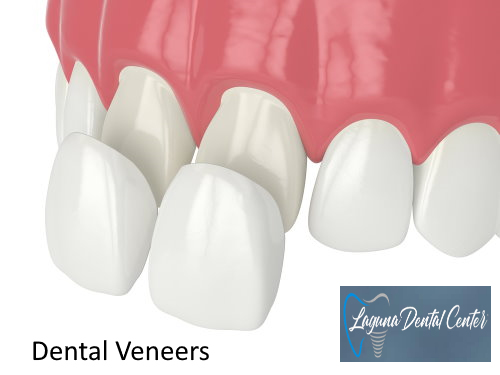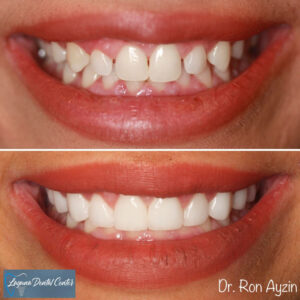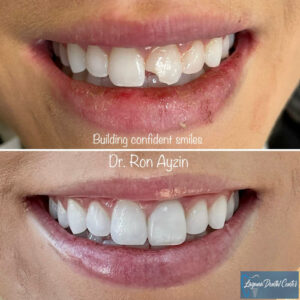Table of Contents

What are dental Veneers?
Dental veneers are individualized, incredibly thin tooth-front coverings. Dental veneers, when affixed to the front of the teeth, change the size, shape, color, or length of the teeth. Materials that complement your natural teeth are used to create veneers. Dentists frequently refer to dental veneers as porcelain veneers.
What are the types of dental Veneers?
Porcelain Veneers
Porcelain veneers are seamless, tooth-like, and match the color of your actual teeth. Stain-resistant porcelain veneers are safe for your gums and neighboring teeth. Veneers made of porcelain are less likely to shatter, chip, or fracture. Plaque accumulation on porcelain veneers is uncommon with good dental hygiene. These veneers are highly sturdy and long-lasting, usually lasting between 8 and 15 years. For people who want to make modest changes to their teeth, such as changing the size, shape, or color of their teeth, porcelain veneers are the best option.
Composite Veneers
Composite veneers require less enamel removal and are less intrusive. Veneers made of composite materials combine organic and inorganic materials. The filter is the inorganic component utilized in composite veneers, whilst the coupling agent, resin, and initiator are the organic components. There is very little chance that composite laminates can harm your gum tissue. If cracked or damaged, composite veneers are simple to repair. Although they seem natural, they eventually risk getting stained. Veneers made of composite material can last for five to seven years. Many people favor composite veneers because they are less expensive than porcelain laminates.
What are Lumineers?
Laminates made of porcelain go by the name Lumineers. Lumineers requires little preparation because these are made of a very thin porcelain laminate material. Your teeth are more minimally prepared for a lumineer implantation by removing less natural tooth components. Lumineers are widely used to treat discolored and irregularly shaped teeth. These veneers are soft to the touch, giving them the appearance of being natural. Lumineers are less expensive than porcelain veneers but are not flexible. Lumineers are more prone to breakage and fracture, and thus have a shorter lifespan.
How do dental Veneers work?
1. Examination and Treatment Plan. This happens during the initial dental appointment. During the appointment, the patient can talk over any oral health concerns or cosmetic objectives. Dental veneers may be an excellent alternative for you once the dentist examines your teeth. The potential restorative and cosmetic alternatives, along with any associated costs, will be fully explained to the patient.
2. Preparation of the mouth and creation. The crucial phases of the dental veneer process will be covered during the second appointment.
- Preparing the patient’s mouth. To match the recommended thickness of the veneer, the dentist will scrape away a tiny layer of enamel. When the enamel is removed, the gums could suffer damage. Before the area fully heals, there may be a brief period of slight soreness. Don’t worry; after a few days, you’ll be back to normal as the gums will start to mend swiftly. Before placing the veneers, the dentist will finalize any partially cracked teeth.
- Building a model. After prepping the patient’s mouth, the dentist will make an impression (model) of the patient’s teeth. The production lab receives this model. In accordance with the dentist’s instructions, the veneer will be prepared by skilled technicians using the selected material and color. It may take more than 10 days to complete the treatment, which typically falls around the period of time when the patient’s gums are healing and are easier to fit into their teeth.
3. Application. This completes the dental veneer procedure. This usually takes more than 10 days to finish. The teeth of the patient will be thoroughly cleansed, polished, and roughened. This facilitates the veneers’ adhesion to the teeth. The veneers are then attached with a transparent adhesive. The porcelain material will be applied to the discolored teeth using a nontransparent cement. To make the cement appear natural, it is colored to match the adjacent teeth. Once the application is successful, the patient will be told to seal their mouth to see if the top and lower teeth fit appropriately and pleasantly.
Before and After Pics of Veneer | Laguna Dental Center in Laguna Hills
Make an Appointment with Dr. Ronald Ayzin at Laguna Dental Center to See if You Need Dental Veneers
Dr. Ronald Ayzin at Laguna Dental Center provides Veneers at a cost that our neighbors near can afford.
Call us at (949) 704-6269 to schedule an appointment.
- FREE Porcelain Veneers Consultation ($100 Value).
- FREE Digital X-rays especially to see if a Root Canal is needed ($150 Value).
- We Maximize your Insurance so you pay less out of pocket.
Make an Appointment with Dr. Ronald Ayzin at Laguna Dental Center to See if You Need Dental Veneers
Contact Us:
Is it possible for me to have Dental Veneers?
- Dental veneers are ideal for people with severely stained teeth.
- Dental veneers can improve the appearance of people who have teeth that are out of place, uneven, or abnormally shaped.
- Dental veneers are a great option for people who have a variety of cosmetic dental concerns, including cracks, chips, bulges, or craters in their teeth.
- Veneers are a good option for people whose oral health is in excellent condition.
- Candidates for dental veneers who have worn down teeth are great.
What is the lifespan of dental veneers?
A research in the AACD Journal of Cosmetic Dentistry found that dental veneers have a 91% survival rate. An effective aesthetic fix for anterior teeth is dental veneers. Although veneers are resilient, you should still exercise the required caution.
What are dental veneers major benefits?
- Veneers mimic the appearance and feel of your real teeth.
- Teeth with chips, cracks, or gaps can be repaired with veneers.
- Porcelain veneers can assist with stain removal.
- Veneers for the teeth offer a quick solution for aesthetic problems.
- Compared to other invasive treatments, dental porcelain veneers only require a small amount of enamel removal.
- Veneers require little maintenance.
- With porcelain veneers, you may smile with assurance.
How do dental veneers appear?
Porcelain veneers are made of materials that resemble your teeth’s enamel. Dental veneers feel and appear natural and appealing. Your natural teeth are hidden by the opaque materials used in dental veneers. Veneers are used by dentists to conceal tooth discolouration. By covering up all the blemishes on your teeth, including the cracks and gaps, porcelain veneers give you a gorgeous smile.
How much do Dental Veneers Cost?
Depending on the material you select, dental veneers might cost anywhere from $250 and $2,500 per tooth. Porcelain veneers typically range from $925 to $2,500 per tooth. Composite or resin veneers can range in price from $250 to $1,500 per tooth.
FAQs for Dental Veneers
Can dental veneers cause tooth decay?
Dental veneers cannot, on their own, cause tooth decay, but the tooth they are placed on could get a cavity. Your dentist will be able to identify any abnormalities before they worsen if you receive regular dental checks.
What foods and habits should I avoid with dental veneers?
To extend the lifespan of your dental porcelain laminates, you should refrain from the following foods and behaviors.
- Syrupy or gummy foods like caramel
- Ice, nuts, and hard candies
- Difficult-to-chew meats
- Alcohol, as it weakens the bonding material's surface
- Foods that stain, such as berries, tomatoes, ketchup, coffee, tea, or cola
- Smoking or chewing tobacco
Areas We Serve
Our office serves the following communities.



